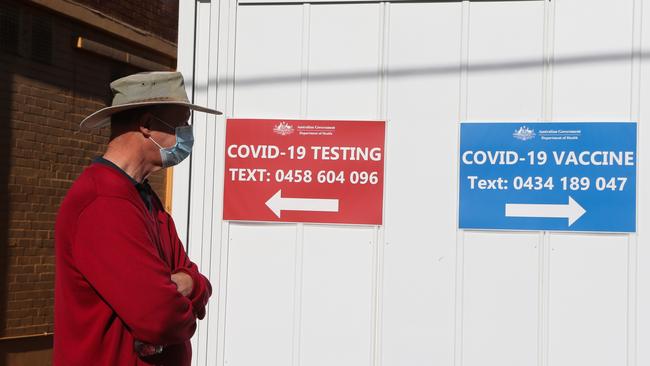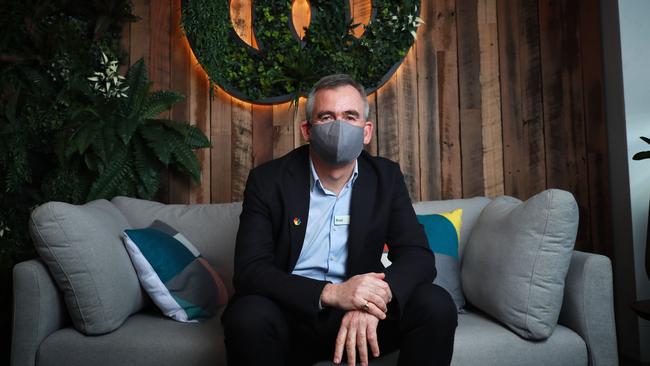
In part this is because, based on Fair Work Ombudsman policy, they are not allowed to mandate vaccines.
The Fair Work Ombudsman said earlier this year: “In the current circumstances, the overwhelming majority of employers should assume that they can’t require their employees to be vaccinated against coronavirus.”
It added: “While the Australian government’s policy is that receiving a vaccination is voluntary, it aims to have as many Australians vaccinated as possible.” The US direction is different, meaning companies will not get into trouble mandating vaccinations.
On any read the US rule makes more sense, and others like Fiji are imposing the same rules on all government and private employees.
US President Joe Biden is reportedly planning to mandate vaccines for federal government workers, just as the New York and Californian state governments have done for their staff.
US companies like Google and Facebook, which are demanding staff be vaccinated before returning to the office, get around objections by saying if you don’t want a vaccine then you must be tested every week.
Wesfarmers boss Rob Scott said: “Once people have had the opportunity it would be good for the government to start mandating vaccinations, masks or testing for certain activities like flying, hospital visits, public transport and theatres.”
He and others are offering staff six hours paid leave to get vaccinations.
Australian mining companies have strict testing requirements before workers hit the mines.
Companies contacted on Thursday all said they were strongly encouraging staff to get vaccines, with many including the big banks offering paid leave.
The big supermarkets are working with the NSW government to fast-track vaccinations for warehouse and front line staff in southwest Sydney to ensure food supplies are maintained for the state.
Woolworths boss Brad Banducci said: “For the first time, with the support of the federal government, we are doing this with a targeted group of team members at key distribution sites in and around western Sydney, and we are hopeful this provides a template for the future.
“We’re also open to offering up our facilities to governments for public vaccine pop-ups if it’s helpful,” he added.

NAB is working with Unicef in a program in which for every NAB staffer vaccinated it makes a donation to help someone in neighbouring countries like PNG and Fiji.
CBA said: “We are strongly encouraging staff to get vaccinated and this will be through informed choice. We will also consider using our offices and branch network to help more broadly with the vaccination program, based on the needs and requirements of the federal and state governments.”
It added: “This will be dependent on the availability of supply and we will crank up our support as that comes online.”
Qantas boss Alan Joyce has raised the issue in Australia but so far the policy is only applied to health and aged care workers and those in affected areas like southwest Sydney.
More bosses are showing the way with Woolworths’ Banducci, Westpac’s Peter King, Wesfarmers’ Rob Scott and NAB’s Ross McEwan fully vaccinated, while mid-40s CBA boss Matt Comyn has had his first Pfizer shot. King said: “It is clear that the majority of Australians need to get vaccinated for us to return to a more normal way of life. We are committed to introducing a workplace vaccination program when we can, making it easier for both employees and their immediate families to get vaccinated.”

Inner-city life won’t return to even close to normal until the state governments can drop the indoor mask rules, because those with big offices report skeleton staff when the mask rules are in force.
ANZ, by way of example, can fit 6000 people in its Melbourne Docklands headquarters, but when the mask rule applies just 200 turn up to work. Once the mask rule is dropped numbers quickly build to 2800-plus.
All of which of course is linked to the need to get people vaccinated. This assumes there is the supply and the government can issue clear and direct policies.
Neither has been a feature of the campaign so far.
–
Rio’s challenge
FMG’s strong quarterly production report on Thursday highlighted the struggle ahead for Rio’s Jakob Stausholm in the Pilbara. FMG’s Elizabeth Gaines reported increased output against a slight fall from Rio and costs edged up to $US15.20 a tonne compared to a 50 per cent increase for Rio to $US18.50 a tonne.
Both had rain and labour shortages but Rio also cited “heritage” issues. This means title owners flexing their muscles and demanding changes to mine plans, which are costly.
The demands, while no doubt justified, show Rio is coming to terms with its Juukan Gorge disaster, which was caused by not working closely with the title owners.
If the mine is edging onto the wrong land then it must move and this is a costly process mid-production, which helps explain why costs are increasing.
Stausholm said he had many talks with title owners and learned a great deal, which suggests long-term the problems will be solved.
But when you rely on iron ore for 77 per cent of your earnings and 66 per cent of sales it helps if you can maximise output.
Right now Rio is constrained by factors both within and outside its control.
Stausholm confided he has had 130 separate meetings with stakeholders in the last six months and the company has worked through 1900 separate land title applications.
Maybe the last half was the peak of the trouble and it gets better from here, which is the hope because high prices won’t be here forever.
Rio was saved in the last half by record prices and, as noted, the positive is that Stausholm is prepared to put the issues on the table.
FMG is also a one-trick pony but it has its foot to the floor and is moving 150 per cent into renewables, which positions it well for the future.








Australian companies are strongly pushing Covid vaccinations for staff but have stopped short of US moves for mandatory measures.